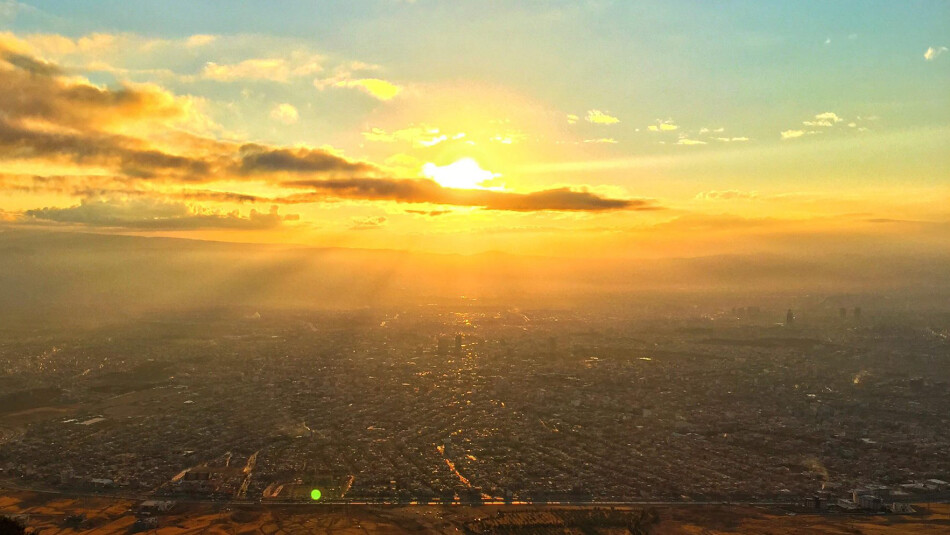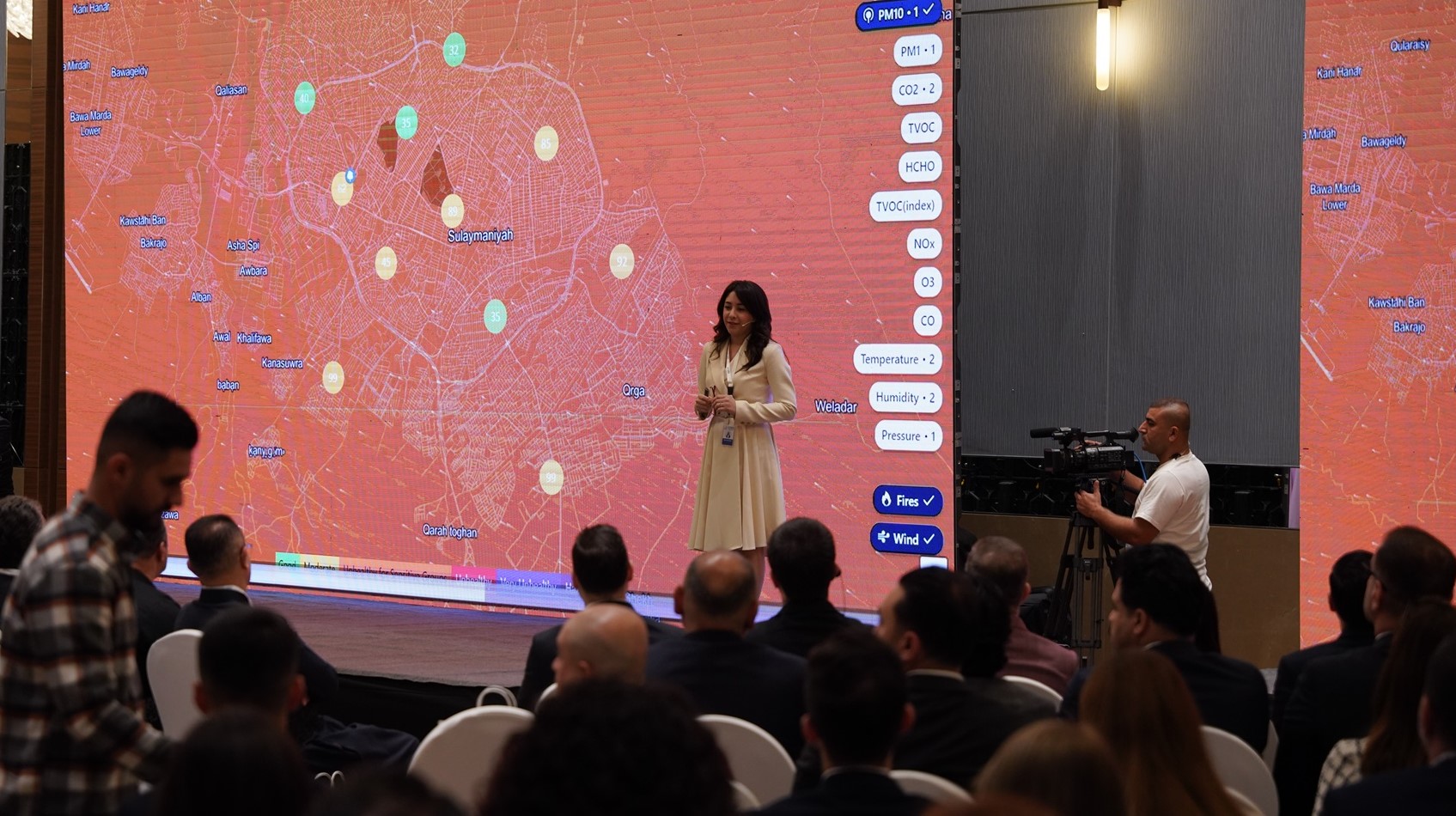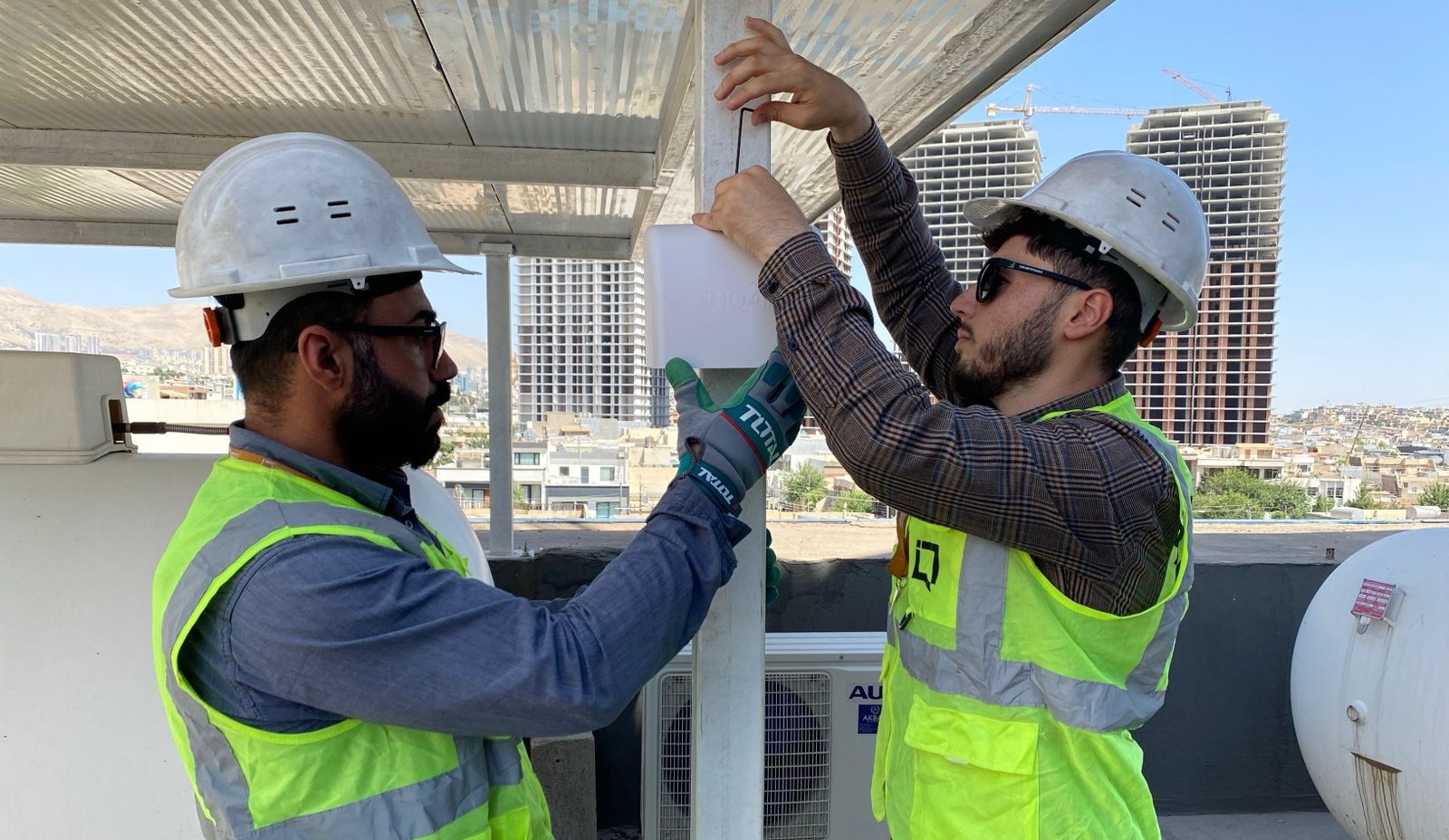
No matter where you live in the city, north or south, or your degree is, through your mobile phone and in a few simple steps, you can learn about the quality of the air in your area; whether it's clean, moderate, or not suitable for breathing.
All these amenities and transparency are part of an initiative by the Med Foundation, aiming to gather detailed data on air quality in the Kurdistan Region of Iraq KRI for analysis and evaluation. This information is presented in simple language on a website for the public.
The Air Quality Network consists of 28 specialized sensors, with 25 installed in Sulaymaniya, Garmian, and Raperin, two in Halabja, and one in Kirkuk.
"In this project, we had two goals; one was to gather data, as development in any sector requires data, which is not easily available in our region. Therefore, we came up with a smart and modern solution using technology," said Hanar Hadi, manager of projects at Med Foundation.
The second objective of the project is to get information about certain areas in the favor of the local service.
"There are many gaps in the environment, especially in terms of information about the weather, now it is gradually improving after the data revolution by our institution," Hanar said. The Mid Foundation is a non-profit organization working in the field of development.
Ninety percent of people breathe polluted air, including Iraq, which is one of the "most polluted" countries in the world, according to IQAir, a Swiss air quality technology company. The World Health Organization WHO warns that indoor and outdoor air pollution poses a threat to adults' lives and the climate, causing premature deaths of seven million people worldwide annually.
One of our goals is to acquire data, as development in any sector requires data.
Transforming data into useful information
The Air Quality Network is the first of its kind in the KRI and other parts of Iraq, according to MED Foundation. Currently operating in Sulaymaniya, Halabja, Garmian, and Raperin, the initiative aims to expand to Erbil and Duhok, covering the entire country.
The project was announced in November 2023, in coordination with the IQAir. Until last April, efforts were focused on installing smart sensors to monitor air quality in an area of 17,000 square kilometers.
The network is managed by three different groups: data analysts, maintenance staff, and equipment monitoring personnel.
Each device surveys a five-kilometer radius and collects data on air quality, pollution levels, temperature, pressure, and humidity every three minutes. The air quality network closely monitors particulate matter (PM), which significantly impacts health.
Each device will survey five kilometers around itself and collect data, in the installation of the devices and determine the locations, inside and outside the city, the opinion of environmental experts, especially the College of Environmental Sciences of Sulaimani University is considered, Hadi said.
According to the Med Foundation, fine particles (PM2.5) from fuel combustion can penetrate deep into the lungs and bloodstream, causing respiratory and heart problems, affecting brain health and fetal development.
PM10, from inhaling large air particles like dust by construction projects, can irritate the respiratory tract and cause asthma and bronchitis, among other health issues, including heart problems.

That data is crucial for identifying sources of air pollution, guiding exposure reduction, and implementing precautionary regulations to safeguard public health in areas with high industrial and automotive emissions.
The initiative has several partners: (IQ) Internet Provider Company sponsored 20 sensor devices and assisted with their repair and installation. The Civilization Development Organization (CDO) provided an additional 10 devices and launches awareness campaigns about data collection and preserving air quality. The College of Environmental Sciences at Sulaymaniya University conducts scientific analysis of the data.
Bakhtiar Ahmad, Director General of CDO, stated, "Our goal from supplying 10 devices for the project was to focus on air quality as earlier initiatives mainly focused on earth and soil. Air quality in the Kurdistan Region is deteriorating day by day."
Another significant aspect of the project, according to Ahmad, is that people have the right to know the daily air quality of their location, be aware of the issue, and receive continuous updates.
Air pollution is one of the main causes of cancer as the Kurdistan Regional Government KRG Ministry of Health registered 9,911 new cancer cases in the KRI in 2023 alone, with lung cancer being the second most common type.
North Sulaymaniyah has cleaner air than the southern part
The Air Quality Network will serve as a source for in-depth analysis of air pollution sources, sustainable solutions, data-driven decision-making, and efforts to protect public health for a more sustainable and environmentally friendly future, according to Med Foundation.
Data collected over eight months of operating the air quality sensors were analyzed by the College of Environmental Sciences at Sulaymaniya University.
Sulaymaniya province has clean to moderate air
Dr. Emad Omar, the dean of the College of Environmental Sciences and an expert in data analysis, stated that the analysis revealed Sulaymaniya province has clean to moderate air, ranging between 16.7 and 17, which is encouraging by international standards.
The air quality criteria in the network range from 0 to above 50 degrees, indicating the cleanliness and pollution levels of the air. Omar explained that if the score is between 0 to 5, the air is very clean, from 5 to 15 it's moderate, 15 to 25 is also medium but unsuitable for patients of asthma and above that, it's considered dirty, posing risks for people with respiratory issues.
"We analyzed the data by the hour, day, and month. Sulaymaniya is divided into three zones: the north has very clean air, the center has moderate air, and the south has ocassionally moderate dirty air," the dean noted.
He added that the air in the southern part of the city is not hazardous, and areas outside the city like Hawraman, Barzanja, Mawat, Qaladze, and Chawarta have clean to moderate air.
Emad Omar pointed out that Chamchamal and Kalar are the only places facing air quality issues due to their proximity to the desert-like nature, making the air more polluted. However, their pollution levels are still better than Baghdad's, which reaches 48.3, exceeding international standards.
Iraq is the world's fifth most vulnerable country to climate change, facing various environmental challenges from oil and gas production to inadequate waste management, with 12 million tons of waste produced annually.
The transportation sector, particularly land transport, accounts for 15% of greenhouse gas emissions, making it the second-largest source of pollution after energy and industry.
According to the KRG Environment Board, there are approximately 2.4 million vehicles and 7,354 generators in the region, with 1,759 generators located in Sulaymaniya province. These generators emit toxic smoke daily, posing a threat to human and animal health.
The Air Quality Network Initiative shares air data and information through a dedicated dashboard on the IQAir website and the AirVisual mobile application.
The project manager at MED said citizens are not told what the air quality is like where the equipment is located, but citizens go to the website themselves and see the situation The quality of the air is determined by color; it starts with green, then yellow, orange, red, purple and dark purple” According to Hadi, each color indicates air qualtiyt from good to bad and worse.

Installation of air quality measuring devices. Med Foundation
On the website, a map displays the locations of air quality devices, leading users to the official website for device data. Users can view new air measurements every three minutes.
"Every citizen can benefit from it. Those with advanced degrees and even illiterate individuals can benefit, as the information is categorized by different criteria and colors," Hadi explained.
Filling an environmental gap
The air quality network data and information provide an opportunity to enhance research resources on the environment, especially regarding air pollution.
Dr. Dilpak Ahmad, a lecturer at Garmian University and an expert in environmental and water risk, stated that this initiative will have significant environmental impacts. Researchers can utilize the data to analyze air quality levels in Kurdistan comprehensively.
She emphasized that if the devices are of high quality, connected to satellites, and receive continuous data, their reliability increases.
Dr. Ahmad also highlighted the importance of station placement in cities to effectively monitor pollution sources based on various factors and pollution sources.
Air pollution is a global issue, and increasing greenery through planting fine-leaved trees is one solution. A medium-sized tree absorbs 1.7 kilograms of carbon dioxide and produces 120 liters of oxygen daily. It takes at least seven trees to offset the pollution caused by a single car.
Omar mentioned that the data collected, known as mega data, undergoes thorough scientific and academic analysis through specialized software. This process, from data collection to analysis and evaluation, is the first in Kurdistan and Iraq, aligning with practices in developed countries.
The analyzed data is "reliable and entirely scientific." They plan to analyze the data for a year post-project implementation and publish it in an international journal as part of high-level research, highlighting Sulaymaniya as one of the cleanest cities in the Middle East.
Diverse perspectives
Individual awareness is a key component of the Air Quality Network Initiative, managed by CDO as part of the project. However, it awaits a memorandum of understanding.
"The project should have been further developed, with a memorandum of understanding signed between us, IQ, Kurdsat Media Agency, and Med Foundation. However, this step has not been completed, and it is not our responsibility to prepare it," Bakhtiar Ahmad clarified.
He emphasized that their role is to raise awareness about protecting air quality, providing citizens with simple information. For instance, they inform the public about specific areas in Sulaymaniya where the air quality may not be suitable for individuals with asthma.
Another challenge faced by the air quality network, common throughout the Kurdistan Region, is the lack of round the clock electricity.
"These devices require constant internet and electricity. Since they were sourced from the Swiss company IQ Air, their standards do not match ours," the MED project manager explained.
Due to electricity and internet issues, the equipment had to be relocated in some areas despite being designed for fixed installation, Hadi added.
*This story has been produced as part of the program to expand the role of women journalists in environmental coverage, by KirkukNow Media Outled, funded and supported by the Ministry of Foreign Affairs of the Federal Republic of Germany.